Day 55-57, September 8-10, 2008 (No Malaria)
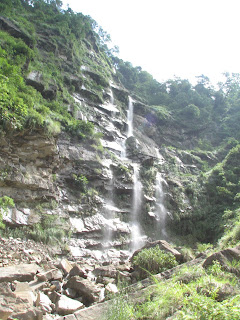
Namaste.
My week long road trip away from Kathmandu began with the 6 hour drive west through the mountains to the city of Pokhara. The driving, as it is everywhere, was hair-raising. The trip to Pokhara is several hundred kilometers of road winding up and down through the Himalayan Mountains. There is not as much traffic as in the cities but the speed at which traffic drives, along with the condition and cliff-side location of the roads, makes it scarier than any amusement park ride I’ve ever been on. The most dangerous parts of the driving are the landslides. In the 6 hours I spent in the mountains, there were probably 100 of them. Some were fairly recent in which you had to drive over or through them and some were older where people had cleared the road down to one lane. Either way, with driving conditions already less than perfect, every landslide made the road that much more treacherous. Also, I didn’t know that there were so many different kinds of landslides. You have big landslides and little landslides; You have rock landslides and you have dirt landslides; You have wet landslides and you have dry landslides. I preferred driving through the little, rock, dry ones the most and the big, dirt, wet ones the least. During one particular big, wet, mud one, some more mud actually started to fall while we were driving through it. It wasn’t much but it scared the hell out of me.
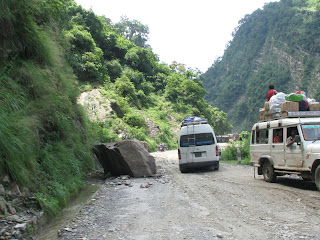
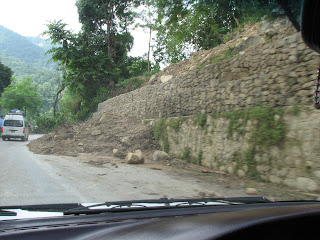
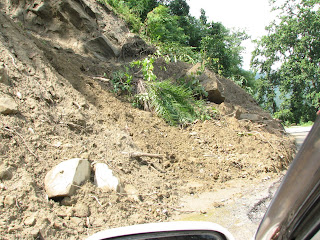
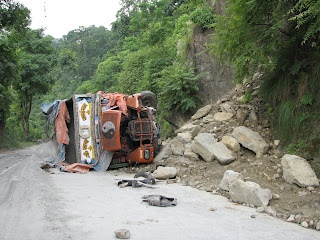
The entire trip, Arjun, my driver was trying to describe different things to me about what we were seeing with little success. I think that his vocabulary is probably OK but his accent is very hard to understand. When we were passing through the big, wet, mud landslide, I asked him what happens if the mud falls on us. Very clearly and calmly, I heard him answer, “dead probably.” That was not reassuring…at all. I also later asked him if he had ever been hit in by falling rocks and he laughed and said, “Yes.” I asked how many times and he said, “Many.” That is not at all what I wanted to hear when so far removed from any civilization.
One thing that did impress me about Nepal was how smart the animals were. I have driven past thousands of cows, chickens, ducks, water buffalo, dogs, and goats all grazing and playing in and around the road and have only seen two dead dogs. One of those was on top of a giant trash pile, though, so I don’t think it even counts as road kill. All of the animals actually look both ways, like we teach children back home, before crossing the road.
The Nepalese even let their children play by the roadside. There are very young kids sitting on the shoulder playing next to traffic. Some of them look 3 to 5 years old. I wish that the children’s appreciation for traffic stayed with them into adulthood. So far, we’ve driven over 500 kilometers around Nepal and have come close to hitting no children or animals. We have hit one adult (not injured, thank God) and grazed several more. I am pretty sure that most of them have a death wish.
Pokhara is a very nice city. I wish that I could say the same for Lumbini. They are both, like the rest of Nepal, very archaic. I was trying to think about other cities that I have visited that are similar sizes and I decided that Pokhara is about the size of Chang Mai, Thailand and Lumbini is about the size of Hoi An, Vietnam. Both Nepalese cities make their SE Asian counterparts look like Manhattan. Pokhara, even with a large hydroelectric facility fairly close, still has rolling blackouts everyday which are fairly random and last for several hours. You can be sitting in a restaurant or internet café and the power just goes out. You can walk a few blocks away and usually find someplace with some electricity but theirs may or may not go out any minute. Also, for a fairly small city, there are hundreds of cattle living free in the streets. Sometimes the streets were so full of cows that it reminded me of watching old westerns with the cattle drives. Needless to say, they make a huge mess. Other than the blackouts and cattle, Pokhara is a pretty nice place. It is tucked away in the Himalayans and has two large lakes next to it. From the lakes, and several points around the city, you can see the high snow covered peaks in the distance and it is quite beautiful. While I was there, I did some kayaking on the lake and got up early one morning to try to see the sunrise. I didn’t get a very clear sunrise but it was beautiful nonetheless. Pokhara, like Chang Mai and Hoi An, is a big backpacker spot. Unlike those places, though, where the backpackers seem to be couples or students on holiday, Pokhara was almost exclusively hippy. I’ve never seen so many dreadlocks in my life.
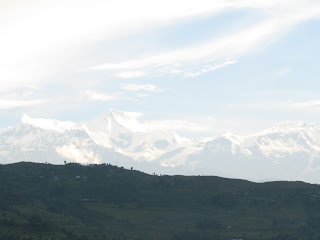
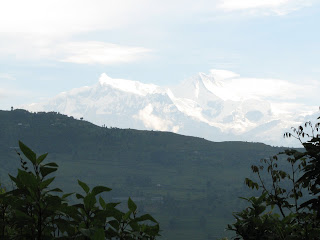
All in all, Pokhara was pretty relaxing. I was still there before the beginning of official tourist season, though, and the town seemed to be getting ready. The hotel that I was staying in seemed half-closed and was prepping for the influx of tourists next month. There was a lot of sanding, painting, and cleaning going on. The place was so empty I almost felt like I was staying at the place in The Shining.
Namaste.
My week long road trip away from Kathmandu began with the 6 hour drive west through the mountains to the city of Pokhara. The driving, as it is everywhere, was hair-raising. The trip to Pokhara is several hundred kilometers of road winding up and down through the Himalayan Mountains. There is not as much traffic as in the cities but the speed at which traffic drives, along with the condition and cliff-side location of the roads, makes it scarier than any amusement park ride I’ve ever been on. The most dangerous parts of the driving are the landslides. In the 6 hours I spent in the mountains, there were probably 100 of them. Some were fairly recent in which you had to drive over or through them and some were older where people had cleared the road down to one lane. Either way, with driving conditions already less than perfect, every landslide made the road that much more treacherous. Also, I didn’t know that there were so many different kinds of landslides. You have big landslides and little landslides; You have rock landslides and you have dirt landslides; You have wet landslides and you have dry landslides. I preferred driving through the little, rock, dry ones the most and the big, dirt, wet ones the least. During one particular big, wet, mud one, some more mud actually started to fall while we were driving through it. It wasn’t much but it scared the hell out of me.
The entire trip, Arjun, my driver was trying to describe different things to me about what we were seeing with little success. I think that his vocabulary is probably OK but his accent is very hard to understand. When we were passing through the big, wet, mud landslide, I asked him what happens if the mud falls on us. Very clearly and calmly, I heard him answer, “dead probably.” That was not reassuring…at all. I also later asked him if he had ever been hit in by falling rocks and he laughed and said, “Yes.” I asked how many times and he said, “Many.” That is not at all what I wanted to hear when so far removed from any civilization.
One thing that did impress me about Nepal was how smart the animals were. I have driven past thousands of cows, chickens, ducks, water buffalo, dogs, and goats all grazing and playing in and around the road and have only seen two dead dogs. One of those was on top of a giant trash pile, though, so I don’t think it even counts as road kill. All of the animals actually look both ways, like we teach children back home, before crossing the road.
The Nepalese even let their children play by the roadside. There are very young kids sitting on the shoulder playing next to traffic. Some of them look 3 to 5 years old. I wish that the children’s appreciation for traffic stayed with them into adulthood. So far, we’ve driven over 500 kilometers around Nepal and have come close to hitting no children or animals. We have hit one adult (not injured, thank God) and grazed several more. I am pretty sure that most of them have a death wish.
Pokhara is a very nice city. I wish that I could say the same for Lumbini. They are both, like the rest of Nepal, very archaic. I was trying to think about other cities that I have visited that are similar sizes and I decided that Pokhara is about the size of Chang Mai, Thailand and Lumbini is about the size of Hoi An, Vietnam. Both Nepalese cities make their SE Asian counterparts look like Manhattan. Pokhara, even with a large hydroelectric facility fairly close, still has rolling blackouts everyday which are fairly random and last for several hours. You can be sitting in a restaurant or internet café and the power just goes out. You can walk a few blocks away and usually find someplace with some electricity but theirs may or may not go out any minute. Also, for a fairly small city, there are hundreds of cattle living free in the streets. Sometimes the streets were so full of cows that it reminded me of watching old westerns with the cattle drives. Needless to say, they make a huge mess. Other than the blackouts and cattle, Pokhara is a pretty nice place. It is tucked away in the Himalayans and has two large lakes next to it. From the lakes, and several points around the city, you can see the high snow covered peaks in the distance and it is quite beautiful. While I was there, I did some kayaking on the lake and got up early one morning to try to see the sunrise. I didn’t get a very clear sunrise but it was beautiful nonetheless. Pokhara, like Chang Mai and Hoi An, is a big backpacker spot. Unlike those places, though, where the backpackers seem to be couples or students on holiday, Pokhara was almost exclusively hippy. I’ve never seen so many dreadlocks in my life.
All in all, Pokhara was pretty relaxing. I was still there before the beginning of official tourist season, though, and the town seemed to be getting ready. The hotel that I was staying in seemed half-closed and was prepping for the influx of tourists next month. There was a lot of sanding, painting, and cleaning going on. The place was so empty I almost felt like I was staying at the place in The Shining.
One thing I learned in Pokhara, though, is never eat sushi in Pokhara. I got pressured into trying sushi by one of my guides in a restaurant at which she works. I'll just say that the tuna was from a can and I've had better. 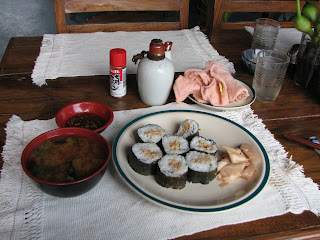
Lumbini is a small town right along the India/Nepal border about another 6 hour ride south of Pokhara. The southern part of Nepal is a big flat plain contrasting the mountains that occupy most of the country. It is hot on the plain. Lumbini was over 100 degrees when I was there. There is really no reason on Earth to spend anytime here except for the fact that it is the birthplace of the Buddha.
The short, short version of the Buddha legend is as follows: The man that we know today as the Buddha, or “Enlightened One,” was born here in Lumbini as the son of the king of the area in the 6th century BC. His given name was Siddhartha Guatama. Shortly after his birth, a seer told the father of the Buddha that he was destined to become either a great king and conquer a huge empire or a great holy man and save the world. His father, being a king himself, wanted his son to follow in his footsteps so tried to shield young Siddhartha from any religious teaching or exposure to world suffering. Siddhartha grew up not knowing of sickness, death, starvation, or poverty. Despite his father’s efforts, Siddhartha left his palaces and eventually saw and old man, sickness, a corpse, and a holy man. He was so moved by leaning that there was suffering in the world, he left his life as a prince and became a monk in search of the meaning of life and salvation for humanity. After several years of meditation and learning, he became the Buddha breaking the endless cycle of birth and death and chose to share the true way with the rest of humanity. Almost all modern religions today incorporate facets of Buddhism.
The birthplace of the Buddha is now situated in the middle of a large park that houses many stupas and monuments that have been erected by many nations. This is one of, if not the most, holy pilgrimage site of Buddhism. I was surprised to see that the temple marking the birthplace of Buddha is so modest. I was expecting a huge, golden temple to have been erected on the site. All there is on this most holy Buddhist site is a simple rectangular brick building. It was so hot that I didn’t feel like touring the dozens of other stupas in the park so I decided to call it an early day and check into the hotel.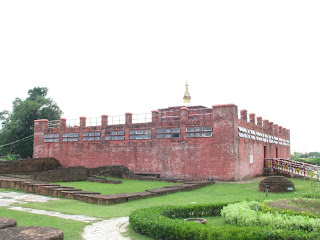
Modern Lumbini town is hot, dirty, disgusting, and unfriendly. There are so many cows everywhere that they make a mess on the hot streets and most of the adult men chew some kind of red tobacco that they spit everywhere that looks like blood. It is not remotely tourist or westerner friendly and after trying to find a descent spot to check email, I decide to hide in my room for the rest of the afternoon and night. The little that I did walk around, I realized that I must have been the only westerner in the town and stuck out like a sore thumb. It seems like the kind of place in which it’s not good to stick out like a sore thumb.
Lumbini is a small town right along the India/Nepal border about another 6 hour ride south of Pokhara. The southern part of Nepal is a big flat plain contrasting the mountains that occupy most of the country. It is hot on the plain. Lumbini was over 100 degrees when I was there. There is really no reason on Earth to spend anytime here except for the fact that it is the birthplace of the Buddha.
The short, short version of the Buddha legend is as follows: The man that we know today as the Buddha, or “Enlightened One,” was born here in Lumbini as the son of the king of the area in the 6th century BC. His given name was Siddhartha Guatama. Shortly after his birth, a seer told the father of the Buddha that he was destined to become either a great king and conquer a huge empire or a great holy man and save the world. His father, being a king himself, wanted his son to follow in his footsteps so tried to shield young Siddhartha from any religious teaching or exposure to world suffering. Siddhartha grew up not knowing of sickness, death, starvation, or poverty. Despite his father’s efforts, Siddhartha left his palaces and eventually saw and old man, sickness, a corpse, and a holy man. He was so moved by leaning that there was suffering in the world, he left his life as a prince and became a monk in search of the meaning of life and salvation for humanity. After several years of meditation and learning, he became the Buddha breaking the endless cycle of birth and death and chose to share the true way with the rest of humanity. Almost all modern religions today incorporate facets of Buddhism.
The birthplace of the Buddha is now situated in the middle of a large park that houses many stupas and monuments that have been erected by many nations. This is one of, if not the most, holy pilgrimage site of Buddhism. I was surprised to see that the temple marking the birthplace of Buddha is so modest. I was expecting a huge, golden temple to have been erected on the site. All there is on this most holy Buddhist site is a simple rectangular brick building. It was so hot that I didn’t feel like touring the dozens of other stupas in the park so I decided to call it an early day and check into the hotel.
Modern Lumbini town is hot, dirty, disgusting, and unfriendly. There are so many cows everywhere that they make a mess on the hot streets and most of the adult men chew some kind of red tobacco that they spit everywhere that looks like blood. It is not remotely tourist or westerner friendly and after trying to find a descent spot to check email, I decide to hide in my room for the rest of the afternoon and night. The little that I did walk around, I realized that I must have been the only westerner in the town and stuck out like a sore thumb. It seems like the kind of place in which it’s not good to stick out like a sore thumb.
2 comments:
What happened to the party at Biondi's posts?
some people couldn't play nice and keep their comments pg so i deleted it
Post a Comment